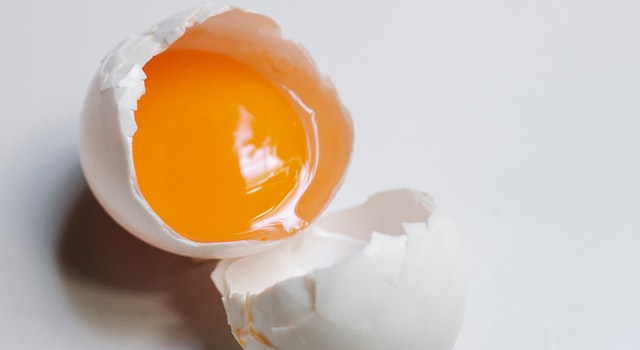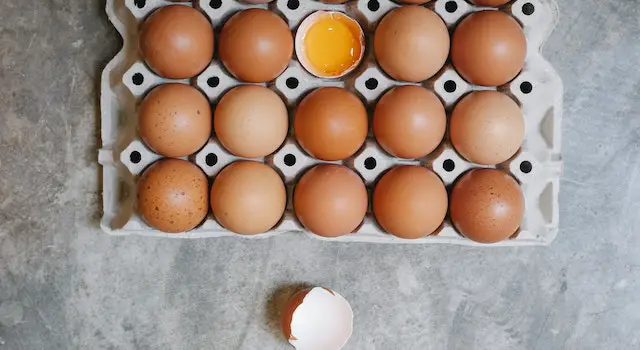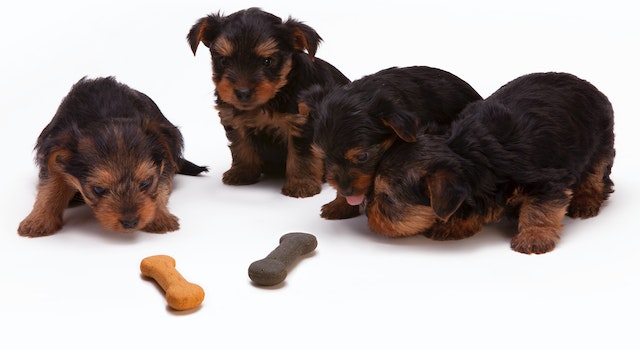Cracked Raw Egg Over Dog Food: Is It A Good Idea?
Giving raw eggs to your dog is not only advisable but also healthy. Adding raw eggs or egg yolks will improve the nutritional content of any dog food, including homemade raw dog food, kibble, canned food, and even homemade raw dog food.
Are Raw Eggs And Eggshells Good For Dogs?
Eggshells are filled with calcium, so they are a good source of extra nutrition for your pet. Additionally, eggshells are also beneficial for dogs with difficulty chewing bones. To ensure safety, ensure that the shells are cooked or boiled before they are served, as uncooked eggshells may still be a risk for Salmonella.
Rich Source of Calcium
Eggshells are made primarily of calcium carbonate. This makes eggs a great natural source of this essential mineral. Calcium is vital for growing and maintaining strong teeth and bones in dogs. It also plays a crucial role in the function of muscles, nerve transmission, and blood clotting. Incorporating cooked eggshells in your dog’s diet may boost calcium levels and improve the overall health of their skeletal system.
To prepare eggshells to feed your dog, it’s essential to ensure they are cooked correctly or boiled. Cooking or boiling eggshells reduces the possibility of contamination by bacteria, specifically Salmonella, which could be in the eggshells. The cooking process makes the egg shells easier to digest for dogs, allowing them to benefit from the calcium content.
Alternative for Dogs who have difficulty chewing
Certain dogs may have trouble chewing bones for various reasons, including dental issues or aging-related factors. In these cases, egg shells that have been cooked and ground up are a good alternative source of vital minerals, such as calcium. Egg shells’ texture can offer the same pleasure and dental benefits as chewing bones, assisting in maintaining dental health and reducing tartar and plaque buildup.
To use cooked egg shells as alternatives to bones, crush them to a fine powder in a blender or coffee grinder. It is then possible to sprinkle egg shells on your dog’s meals or add them to their diet. This lets your dog take in the nutrients in the eggshells without the danger of injury or choking caused by bones.
Although cooked egg shells can offer your dog more nutrients and health benefits, it’s important to remember that they should be part of an overall diet. They shouldn’t be used to replace an entire, nutritionally balanced dog food. Talk to your vet to determine the right amount of cooked egg shells to include in your dog’s diet based on their needs and overall health.
Why Are Raw Egg Shells Good For Dogs?
Eggshells can be a healthy and beneficial addition to your dog’s diet. Eggshells are an excellent source of calcium, glucosamine, and chondroitin. They can aid in strengthening teeth, bones, and joints in dogs.
Rich Source of Calcium
Egg shells are made mainly of calcium carbonate, making eggs a great source of this vital mineral. Calcium is essential to maintaining strong teeth and bones in dogs. It plays an essential role in bone development, density, strength, and the overall health of the skeletal system. Calcium also plays a role in the function of muscles, nerve transmission, and blood clotting.
Feeding raw eggshells to your dog can be an organic and bioavailable source of calcium. The raw egg shells help retain the most nutrients, including calcium, ensuring your dog gets this vital mineral. Incorporating raw eggshells into your dog’s diet will help maintain bone health and avoid deficiencies that could result in osteoporosis or dental issues.
Glucosamine and Chondroitin Content
Eggshells from raw eggs also contain glucosamine and chondroitin, two chemicals known as joint-supporting compounds. The glucosamine compound is a key component of cartilage that cushions joints and improves flexibility. Chondroitin assists in maintaining joint health by encouraging the retention of nutrients and water inside cartilage.
Consuming raw egg shells for your dog could provide an organic source of glucosamine and chondroitin, which can aid in maintaining mobility and joint health. These nutrients especially benefit dogs suffering from ailments like joint inflammation or arthritis. By incorporating raw eggshells into your diet, you can supply them with these substances in a natural and digestible form.
If you are feeding raw egg shells to your pet, it is essential to prepare them correctly. Wash the eggshells thoroughly to remove any traces of the egg, then crush or grind them into an extremely fine powder. This can be accomplished using a clean coffee grinder or a mortar and pestle. Begin by adding a small portion of powdered egg yolks to your dog’s food, and then observe your dog’s reaction. Gradually increase the amount suggested by your vet, considering the size of your dog, age, and requirements.
Are Eggs Good For Dogs Coats?
Yes. Eggs are great for dogs to consume. Of course, they’re abundant in protein; however, apart from that, eggs are an excellent source of linoleic acids and fat-soluble vitamins, such as Vitamin A. These are great for dogs’ coats and skin,” says Dempsey.
Protein for Coat Health
Protein is an essential component of the dog’s diet. It plays a vital role in maintaining a desirable coat. Eggs are a fantastic source of high-quality protein with all the amino acids that dogs require for optimal growth and maintenance of their coats. Amino acids are the basic protein blocks vital for various bodily functions, including healthy hair follicles and skin growth.
The protein found in eggs aids in strengthening the hair shafts, which makes the hair more durable and less prone to breakage. It also helps create keratin, an amino acid that makes up the hair’s structure and contributes to the strength and shine of your hair. Including eggs in a dog’s diet provides them with the protein they require to maintain a shiny and healthy coat.
Linoleic Acid and Fat-Soluble Vitamins
Eggs aren’t only high in protein; they also have essential fats and fat-soluble vitamins, which are vital for the health of your coat and skin. One of these nutrients is linoleic acid, which is an omega-6 fat. Linoleic acid plays an essential function in ensuring the integrity of the skin barrier and helps to prevent dryness, flakiness, and itching. It also aids in reducing inflammation of the skin, improving the overall health of the coat.
Furthermore, eggs are rich in fat-soluble vitamins, such as Vitamin A, which is vital for healthy skin. Vitamin A regulates sebum production, an oil that naturally helps to moisturize the skin and prevent dryness. The proper levels of Vitamin A help to maintain a soft and silky coat. Other fat-soluble vitamins in eggs, including Vitamin D and Vitamin E, also play a significant role in maintaining a healthy coat and skin.
If you feed eggs to your dog to maintain coat health, cooking them before serving is essential. Eggs cooked raw can pose the risk of contamination by bacteria, so it is recommended to avoid feeding eggs in raw form. Eggs cooked in scrambled or hard-boiled form supply the nutrients needed in an uninvolved and digestible way.
Is A Raw Egg Good For Dogs Every Day?
Yes! However, when you give your dog eggs, keeping an eye on balance is important. Ensure that you don’t feed eggs that are raw and whole every day (but more often only a few times per week) and continue to provide them with raw diets full of the nutrients they require for a healthy lifestyle and diet.
Nutritional Benefits of Raw Eggs
Raw eggs are a great source of protein, vital amino acids, vitamins, and minerals. Protein is essential for the growth of muscles and the repair of tissues, as well as overall growth. Amino acids are an essential component that plays various roles within the body, such as maintaining a healthy coat and skin, boosting immune function, and aiding metabolic processes.
Additionally, cooked eggs contain important minerals and vitamins, such as vitamin A, vitamin B12, riboflavin, selenium, and iron. These nutrients are essential to overall well-being and health. Combining protein with the essential nutrients in raw eggs can provide a valuable nutritional boost for dogs.
Importance of Balance and a varied diet
While raw eggs can be beneficial, it is important to remember that balance is essential in a dog’s diet. A daily diet of raw eggs imbalances the nutritional profile since eggs aren’t enough to provide all the nutrients that dogs require. Dogs require diverse diets that include various sources of protein, vegetables, fruits, and other essential nutrients.
By incorporating raw eggs a couple of times per week rather than daily, you can ensure that your dog gets the nutritional benefits without relying on eggs as the primary source of protein. This will allow for a greater variety of nutrition intake and decrease the chance of developing nutritional imbalances or deficiencies.
Consultation with a veterinarian or a dog nutritionist is advised to determine the proper quantity of raw eggs to feed your dog’s needs. They can assist you in assessing your dog’s nutritional requirements, considering any health issues, and providing advice on creating a balanced diet plan.
FAQ’s
Is it safe to give my dog a cracked raw egg over their food?
Yes, in general, it is safe to give your dog a cracked raw egg over their food. However, there are a few precautions to consider. Make sure the egg is fresh and free from any cracks or abnormalities. Also, consult with your veterinarian to ensure that it is suitable for your dog’s specific dietary needs.
What are the benefits of adding a cracked raw egg to my dog’s food?
Cracked raw eggs can be a good source of protein, vitamins, and minerals for dogs. They provide essential nutrients like vitamin A, vitamin D, vitamin E, and omega-3 fatty acids. Eggs can also help improve your dog’s coat and skin health.
Can a cracked raw egg cause health problems for my dog?
In most cases, cracked raw eggs are safe for dogs. However, there is a small risk of bacterial contamination, such as Salmonella, which can cause digestive upset or foodborne illness. To minimize this risk, ensure you handle the eggs properly and only use fresh, high-quality eggs from a reliable source.
How should I introduce a cracked raw egg into my dog’s diet?
When introducing a cracked raw egg into your dog’s diet, start with a small amount. Mix it well with their regular food, ensuring the egg is thoroughly cooked to minimize the risk of bacterial contamination. Observe your dog for any adverse reactions or digestive issues, and consult your vet if you have any concerns.
Are there any situations where it is not advisable to give a dog a cracked raw egg over their food?
While cracked raw eggs are generally safe for dogs, there are a few situations where it may not be advisable. Dogs with certain medical conditions, such as pancreatitis or a history of food allergies, may not tolerate eggs well. Additionally, if your dog has a compromised immune system or if they are very young or elderly, it’s best to consult your veterinarian before adding eggs to their diet.
Are there alternative sources of nutrients I can provide to my dog instead of cracked raw eggs?
Yes, there are several alternative sources of nutrients you can provide to your dog if you prefer not to give them cracked raw eggs. Cooked eggs, such as scrambled or boiled eggs, can still offer similar nutritional benefits. Other options include lean meats like chicken or turkey, fish, and certain fruits and vegetables that are safe for dogs. Consult your vet to determine the best options for your dog’s specific dietary needs.
Cracked Raw Egg Over Dog Food: Is It A Good Idea?
Giving raw eggs to your dog is not only advisable but also healthy. Adding raw eggs or egg yolks will improve the nutritional content of any dog food, including homemade raw dog food, kibble, canned food, and even homemade raw dog food.
Are Raw Eggs And Eggshells Good For Dogs?
Eggshells are filled with calcium, so they are a good source of extra nutrition for your pet. Additionally, eggshells are also beneficial for dogs with difficulty chewing bones. To ensure safety, ensure that the shells are cooked or boiled before they are served, as uncooked eggshells may still be a risk for Salmonella.
Rich Source of Calcium
Eggshells are made primarily of calcium carbonate. This makes eggs a great natural source of this essential mineral. Calcium is vital for growing and maintaining strong teeth and bones in dogs. It also plays a crucial role in the function of muscles, nerve transmission, and blood clotting. Incorporating cooked eggshells in your dog’s diet may boost calcium levels and improve the overall health of their skeletal system.
To prepare eggshells to feed your dog, it’s essential to ensure they are cooked correctly or boiled. Cooking or boiling eggshells reduces the possibility of contamination by bacteria, specifically Salmonella, which could be in the eggshells. The cooking process makes the egg shells easier to digest for dogs, allowing them to benefit from the calcium content.
Alternative for Dogs who have difficulty chewing
Certain dogs may have trouble chewing bones for various reasons, including dental issues or aging-related factors. In these cases, egg shells that have been cooked and ground up are a good alternative source of vital minerals, such as calcium. Egg shells’ texture can offer the same pleasure and dental benefits as chewing bones, assisting in maintaining dental health and reducing tartar and plaque buildup.
To use cooked egg shells as alternatives to bones, crush them to a fine powder in a blender or coffee grinder. It is then possible to sprinkle egg shells on your dog’s meals or add them to their diet. This lets your dog take in the nutrients in the eggshells without the danger of injury or choking caused by bones.
Although cooked egg shells can offer your dog more nutrients and health benefits, it’s important to remember that they should be part of an overall diet. They shouldn’t be used to replace an entire, nutritionally balanced dog food. Talk to your vet to determine the right amount of cooked egg shells to include in your dog’s diet based on their needs and overall health.
Why Are Raw Egg Shells Good For Dogs?
Eggshells can be a healthy and beneficial addition to your dog’s diet. Eggshells are an excellent source of calcium, glucosamine, and chondroitin. They can aid in strengthening teeth, bones, and joints in dogs.
Rich Source of Calcium
Egg shells are made mainly of calcium carbonate, making eggs a great source of this vital mineral. Calcium is essential to maintaining strong teeth and bones in dogs. It plays an essential role in bone development, density, strength, and the overall health of the skeletal system. Calcium also plays a role in the function of muscles, nerve transmission, and blood clotting.
Feeding raw eggshells to your dog can be an organic and bioavailable source of calcium. The raw egg shells help retain the most nutrients, including calcium, ensuring your dog gets this vital mineral. Incorporating raw eggshells into your dog’s diet will help maintain bone health and avoid deficiencies that could result in osteoporosis or dental issues.
Glucosamine and Chondroitin Content
Eggshells from raw eggs also contain glucosamine and chondroitin, two chemicals known as joint-supporting compounds. The glucosamine compound is a key component of cartilage that cushions joints and improves flexibility. Chondroitin assists in maintaining joint health by encouraging the retention of nutrients and water inside cartilage.
Consuming raw egg shells for your dog could provide an organic source of glucosamine and chondroitin, which can aid in maintaining mobility and joint health. These nutrients especially benefit dogs suffering from ailments like joint inflammation or arthritis. By incorporating raw eggshells into your diet, you can supply them with these substances in a natural and digestible form.
If you are feeding raw egg shells to your pet, it is essential to prepare them correctly. Wash the eggshells thoroughly to remove any traces of the egg, then crush or grind them into an extremely fine powder. This can be accomplished using a clean coffee grinder or a mortar and pestle. Begin by adding a small portion of powdered egg yolks to your dog’s food, and then observe your dog’s reaction. Gradually increase the amount suggested by your vet, considering the size of your dog, age, and requirements.
Are Eggs Good For Dogs Coats?
Yes. Eggs are great for dogs to consume. Of course, they’re abundant in protein; however, apart from that, eggs are an excellent source of linoleic acids and fat-soluble vitamins, such as Vitamin A. These are great for dogs’ coats and skin,” says Dempsey.
Protein for Coat Health
Protein is an essential component of the dog’s diet. It plays a vital role in maintaining a desirable coat. Eggs are a fantastic source of high-quality protein with all the amino acids that dogs require for optimal growth and maintenance of their coats. Amino acids are the basic protein blocks vital for various bodily functions, including healthy hair follicles and skin growth.
The protein found in eggs aids in strengthening the hair shafts, which makes the hair more durable and less prone to breakage. It also helps create keratin, an amino acid that makes up the hair’s structure and contributes to the strength and shine of your hair. Including eggs in a dog’s diet provides them with the protein they require to maintain a shiny and healthy coat.
Linoleic Acid and Fat-Soluble Vitamins
Eggs aren’t only high in protein; they also have essential fats and fat-soluble vitamins, which are vital for the health of your coat and skin. One of these nutrients is linoleic acid, which is an omega-6 fat. Linoleic acid plays an essential function in ensuring the integrity of the skin barrier and helps to prevent dryness, flakiness, and itching. It also aids in reducing inflammation of the skin, improving the overall health of the coat.
Furthermore, eggs are rich in fat-soluble vitamins, such as Vitamin A, which is vital for healthy skin. Vitamin A regulates sebum production, an oil that naturally helps to moisturize the skin and prevent dryness. The proper levels of Vitamin A help to maintain a soft and silky coat. Other fat-soluble vitamins in eggs, including Vitamin D and Vitamin E, also play a significant role in maintaining a healthy coat and skin.
If you feed eggs to your dog to maintain coat health, cooking them before serving is essential. Eggs cooked raw can pose the risk of contamination by bacteria, so it is recommended to avoid feeding eggs in raw form. Eggs cooked in scrambled or hard-boiled form supply the nutrients needed in an uninvolved and digestible way.
Is A Raw Egg Good For Dogs Every Day?
Yes! However, when you give your dog eggs, keeping an eye on balance is important. Ensure that you don’t feed eggs that are raw and whole every day (but more often only a few times per week) and continue to provide them with raw diets full of the nutrients they require for a healthy lifestyle and diet.
Nutritional Benefits of Raw Eggs
Raw eggs are a great source of protein, vital amino acids, vitamins, and minerals. Protein is essential for the growth of muscles and the repair of tissues, as well as overall growth. Amino acids are an essential component that plays various roles within the body, such as maintaining a healthy coat and skin, boosting immune function, and aiding metabolic processes.
Additionally, cooked eggs contain important minerals and vitamins, such as vitamin A, vitamin B12, riboflavin, selenium, and iron. These nutrients are essential to overall well-being and health. Combining protein with the essential nutrients in raw eggs can provide a valuable nutritional boost for dogs.
Importance of Balance and a varied diet
While raw eggs can be beneficial, it is important to remember that balance is essential in a dog’s diet. A daily diet of raw eggs imbalances the nutritional profile since eggs aren’t enough to provide all the nutrients that dogs require. Dogs require diverse diets that include various sources of protein, vegetables, fruits, and other essential nutrients.
By incorporating raw eggs a couple of times per week rather than daily, you can ensure that your dog gets the nutritional benefits without relying on eggs as the primary source of protein. This will allow for a greater variety of nutrition intake and decrease the chance of developing nutritional imbalances or deficiencies.
Consultation with a veterinarian or a dog nutritionist is advised to determine the proper quantity of raw eggs to feed your dog’s needs. They can assist you in assessing your dog’s nutritional requirements, considering any health issues, and providing advice on creating a balanced diet plan.
FAQ’s
Is it safe to give my dog a cracked raw egg over their food?
Yes, in general, it is safe to give your dog a cracked raw egg over their food. However, there are a few precautions to consider. Make sure the egg is fresh and free from any cracks or abnormalities. Also, consult with your veterinarian to ensure that it is suitable for your dog’s specific dietary needs.
What are the benefits of adding a cracked raw egg to my dog’s food?
Cracked raw eggs can be a good source of protein, vitamins, and minerals for dogs. They provide essential nutrients like vitamin A, vitamin D, vitamin E, and omega-3 fatty acids. Eggs can also help improve your dog’s coat and skin health.
Can a cracked raw egg cause health problems for my dog?
In most cases, cracked raw eggs are safe for dogs. However, there is a small risk of bacterial contamination, such as Salmonella, which can cause digestive upset or foodborne illness. To minimize this risk, ensure you handle the eggs properly and only use fresh, high-quality eggs from a reliable source.
How should I introduce a cracked raw egg into my dog’s diet?
When introducing a cracked raw egg into your dog’s diet, start with a small amount. Mix it well with their regular food, ensuring the egg is thoroughly cooked to minimize the risk of bacterial contamination. Observe your dog for any adverse reactions or digestive issues, and consult your vet if you have any concerns.
Are there any situations where it is not advisable to give a dog a cracked raw egg over their food?
While cracked raw eggs are generally safe for dogs, there are a few situations where it may not be advisable. Dogs with certain medical conditions, such as pancreatitis or a history of food allergies, may not tolerate eggs well. Additionally, if your dog has a compromised immune system or if they are very young or elderly, it’s best to consult your veterinarian before adding eggs to their diet.
Are there alternative sources of nutrients I can provide to my dog instead of cracked raw eggs?
Yes, there are several alternative sources of nutrients you can provide to your dog if you prefer not to give them cracked raw eggs. Cooked eggs, such as scrambled or boiled eggs, can still offer similar nutritional benefits. Other options include lean meats like chicken or turkey, fish, and certain fruits and vegetables that are safe for dogs. Consult your vet to determine the best options for your dog’s specific dietary needs.




